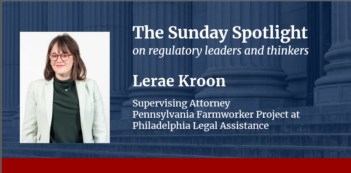
The new rule would impose fiduciary duties on financial professionals in additional circumstances.
Millions of Americans rely on financial professionals for advice about retirement investment accounts. Contrary to common belief, however, financial professionals frequently have no duty to give advice that is in an investor’s best interests.
The U.S. Department of Labor recently proposed a rule that would hold financial professionals accountable more often. The rule would impose fiduciary duties on financial professionals under the Employee Retirement Income Security Act (ERISA) in circumstances investors often believe are already covered, such as when receiving one-time advice about account rollovers.
ERISA was originally passed in the 1970s in response to public concern about pension plan mismanagement and abuse from financial professionals. The federal statute imposes duties on fiduciaries, including the duty to act in the best interests of the investor.
ERISA defines a fiduciary as someone who has “any authority or control” over an investment plan or who gives advice “for a fee or other compensation.”
Shortly after ERISA’s passage, the Labor Department issued a regulation that clarified when fiduciary status was conferred. Under the regulation’s five part test, a fiduciary is someone who, in part, gives individualized recommendations about investments on a “regular basis,” pursuant to a mutual agreement that the advice will serve as the “primary basis for investment decisions.”
The Labor Department drafted this definition at a time when most employee retirement savings were managed by professional asset managers. At that time, the definition provided sufficient investor protection under this common investment structure.
In recent decades, however, professionally-managed pension plans have shifted to individual account plans, such as 401(k) and IRA plans. This shift was not accounted for in the current definition and leaves common advice today out of the definition’s reach.
When financial professionals are not considered fiduciaries, they are not subject to the duties imposed by ERISA and are not restricted from giving advice that would benefit their own professional or financial interests, rather than those of the investor.
Because of changes in investment practices and their implications, the Labor Department is proposing to update the definition—its fourth attempt to do so since 2010.
The Labor Department argues that the current definition harms investors because they expect advice they receive from financial professionals to be in their best interests and they rely on that advice as a result. The agency claims that the new rule would help close the gap and better meet investors’ expectations.
The National Association of Insurance and Financial Advisors (NAIFA), an opponent of the proposed rule, argues that existing state and federal measures already sufficiently protect investors.
NAIFA points to a model state rule that requires that every recommendation from agents and insurers be in investors’ best interests. Forty-three states have adopted the model rule since 2019.
NAIFA also notes that a recent rule from the Securities and Exchange Commission requires broker-dealers to act in investors’ best interests when making recommendations about securities transactions or investment strategies.
But the Labor Department claims that both the state and federal actions are more limited than its proposal. According to the agency, the model state rule does not apply to pension or welfare plans, and the Securities and Exchange Commission’s rule does not cover advice about workplace retirement plans. The Labor Department explains that the proposed rule would apply to all investments, regardless of the type.
The proposed rule is part of the Biden Administration’s larger push to eliminate “junk fees” for Americans. The Biden Administration considers money paid to financial advisors with conflicts of interest to be a junk fee, since investors may get lower returns when their investments are not based on their own best interests.
Other agencies have also acted to eliminate junk fees in response to President Biden’s push.
The Consumer Financial Protection Bureau recently issued guidance stating that financial overdraft and depositor fees are likely unlawful. This guidance resulted in over $100 million in refunds for consumers.
The Federal Trade Commission proposed a rule that would require businesses to show the full price of a product or service in the initial advertisement. Similarly, the Department of Transportation proposed a rule that would require airlines to disclose fees for bags and flight changes up front.
The Biden Administration claims that the Labor Department’s proposed rule would contribute to its larger effort to protect consumers financially and would lead to significant savings for American investors. The Administration estimates that the rule’s impact on advice about rolling money into IRA accounts alone would impact five million investors and over $779 billion dollars.
The Labor Department published its proposed rule on November 3 and closed the public comment period on January 2, 2024. As of January 2, the Labor Department received more than 17,000 comments on the proposal.



